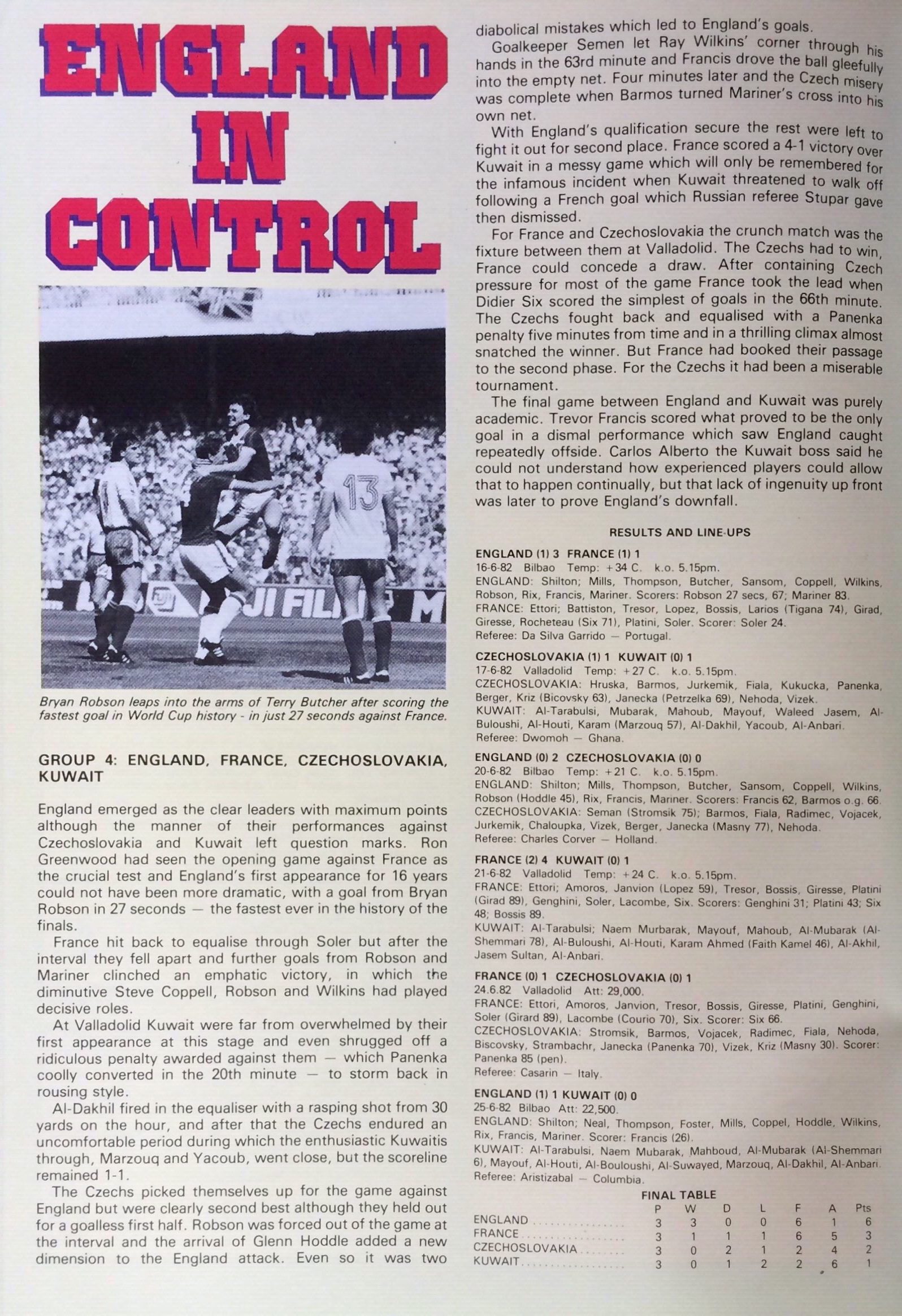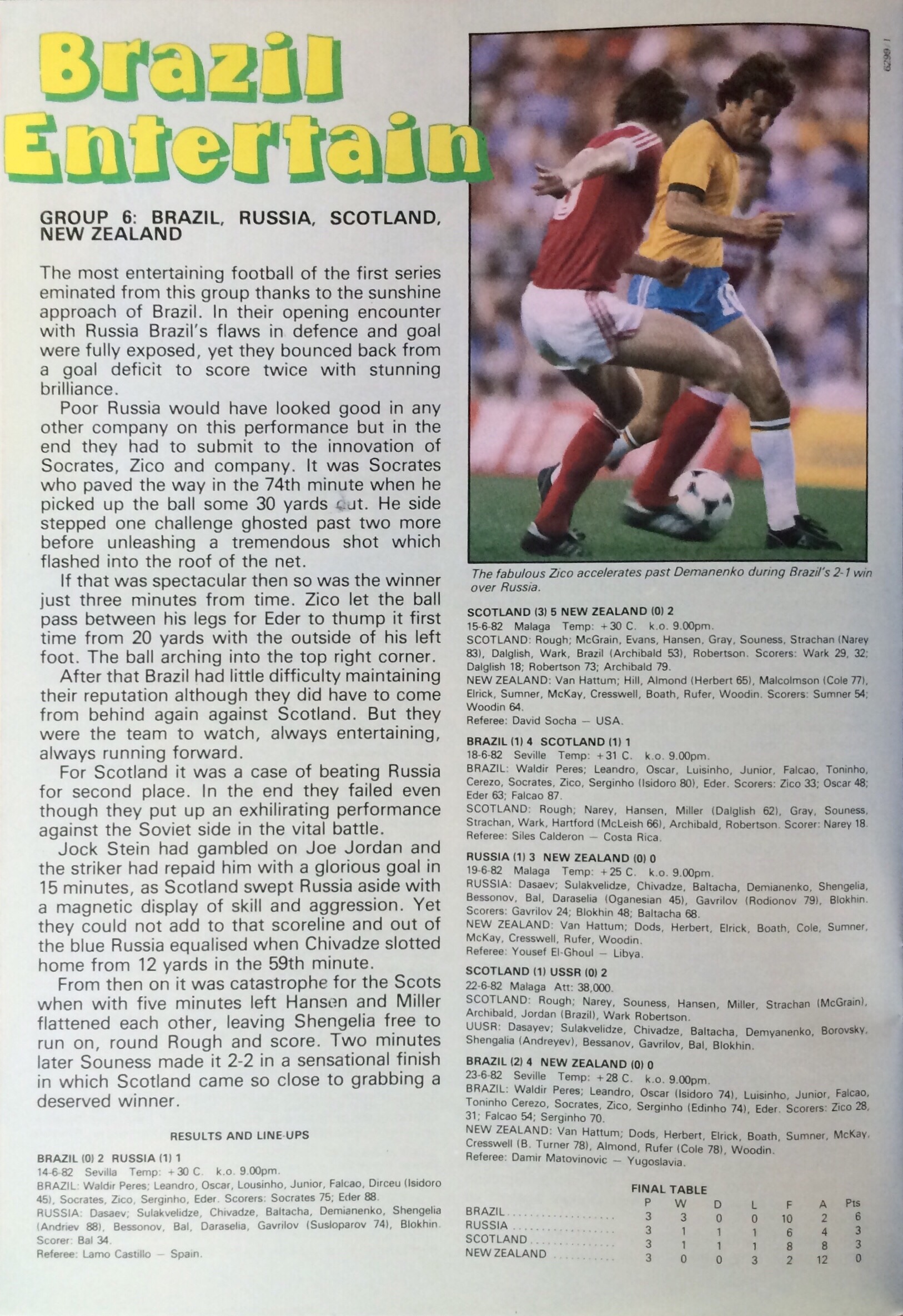World cup 1982
World cup 1982
Судьбоносный Чемпионат Мира-1982 и его. Трагедия!

Да, чемпионат мира-1982 кончился как-то ни так. как он должен был кончиться. И дело, в конечном счёте, было даже не в победе «закрыто-оборонительной» итальянской сборной Э.Беарзотта. Тем более, что как показал и чемпионат Мира-82, и предыдущий, домашний для них чемпионат Европы-80, итальянцы Энцо Беарзотта и в атакующе инициативном стиле были способны уже, в отличие от их предшественников 60-70гг, тягаться и даже переигрывать, практически кого угодно. Другое дело, что так тогда вышло, что все три свои главные победы (над Аргентиной, ФРГ, и особенно в досрочном финале над Бразилией, Италия тогда оддержала в контратакующем и «умеренном»-половинчатом стиле. Но уже наличие в их сборной 1982года такого подчёркнутого диспетчера и изысканного Дирижёра атак, как Ж-К.Антониони, да ещё и в сочетании, с другим таким, технически изощрённым, изысканным полузащитником-созидателем, как Бруно Конти, несомненно, говорило уже о том, что сборная Энцо Беарзотта в 1982 году была готова и способна тягаться в открыто- атакующем стиле с кем угодно.
Другое дело, что в матче с Бразилией всё для них так складывалось что «излишне» идти вперёд стало и не обязательно, а перед финальным матчем с ФРГ они, к сожалению, потеряли уже из-за травмы Антониони, что фактически, уже само по себе, предопределяло их контратакующую тактику в финальном матче. Но дело всё-же, думаю, было не в этом. А наверное, прежде всего в том, что итальянская сборная, даже при всём к ней уважении, в финале всё-же играть была не должна. Ибо, как не рядись она тогда в новые одежды, её внутренней стихией по-прежнему была контратака. Безусловно, моральными если и не чемпионами мира, то безусловными Законодателями мод на то, чтобы не только считаться безоговорочно сильнейшими. но и подобно Прометеям нести футбольному миру- черты и Контуры Футбола Будущего, были тогда бразильцы Теле Сантаны!
Многие тогда, и не без оснований, считали Квинтэссенцией той бразильской сборной, по истине шедеврального кудесника (поднападающего) Зико. но я бы всё-же особую роль и предназначение в той Галактической Симфонии Теле Сантаны придал бы трём центральным полузащитникам: Сократесу, Фалькао и Тониньо Серезо, действовавших не только в вездесуще тотальном стиле, по всему полю, но и. эстетически и интеллектуально предвосхищая и предчувствуя общекомандную игровую Музыку на поле. заставляя и своих более «заземлённых» партнёров действовать в том-же Прометеевско- всеобъемлющем ключе.
Конечно, в финале тогда с бразильцами должна была встретиться Аргентина Луиса-Сезара Миннотти, наиболее близко стоящая тогда по философии и игровому мировоззрению к Команде-Симфонии Теле Сантаны. Ардилес, Бертони, Кемпес, Марадона(я специально не поставил его здесь, в этом перечне, первым- чтобы подчеркнуть его далеко не главенствующую роль в том игровом созвездии, да и самой тренерской концепции Миннотти), Рамон Диас. уже сами по себе задали бы той встрече, по истине магистральное для всего футбола направление, выведя и возведя его на совершенно новые Вершины (конечно, могут сказать, что они тогда и так встретились- но та встреча, во втором групповом этапе, конечно, по духу была далеко не финальной. уже хотя-бы потому, что аргентинцы перед ней получили тяжелейшую моральную травму, после того безобразного судейства в матче с Италией, приведшего их тогда к совершенно незаслуженному поражению. )
Другим, возможно чуть менее оптимальным соперником(а правильней сказать, партнёром!) Бразилии по финальному матчу могла быть и сборная ФРГ Ю.Дерваля (во главе с Брайтнером, Магатом, Кальтцем, Бригелем, Литтбарски и, пусть и травмированном, но по-прежнему, несомненно, харизматичным по своему воздействию на игру Румменигге). Впрочем, немцы тогда, на идейном уровне, в полуфинале во многом были переиграны. каким-то европейским подобием команды Теле Сантаны- утончённой и лучезарной Сборной Франции Мишеля Идальго, которой тогда, наверное, лишь генетическо-инфернальная тевтонская жестокость немцев, вкупе с по-роковому трагически отвернувшейся от них Фортуной. так и не позволили тогда достичь Финала. а возможно, кто знает, даже заменить на самом Пьедестале ЧМ-1982 самих, не менее трагических на том турнире бразильцев.
В общем, к огромному сожалению, для всех ценителей футбола, как явления, несомненно куда более высокого чем просто спорт, два главнейших, магистральных и Судьбоносных для его будущего развития, матча (Бразилия-Италия и Франция-ФРГ) закончились на Чемпионате Мира-1982. увы, победами совершенно не тех команд, которые должны- а возможно, даже и обязаны!- были победить, чтобы Футбол пошёл по какому-то, не только правильному, но и. бесконечному и Высокому Пути. Увы, после этого всё пошло не так.
И если Чемпионат Мира-1978 кончался феерической победой, в не менее феерическом финале, блистательной и подчёркнуто атакующей Аргентинской сборной Луиза Миннотти, во главе с Кемпесом, Лукке, Ардилесом, Бертони. утверждающим тогда тотально-открытый и подчёркнуто Созидательный стиль. то Чемпионат Мира-1982, несмотря на все, такие великие его предпосылки, кончился по-сути. ничем. И Футбол, увы, с того момента пошёл далеко не по тому Пути, по которому он мог и должен был пойти.
P.S. Или вместо заключения. Часто приходилось слышать, что в какой-то мере «революционными» для развития Мирового футбола стали Чемпионаты Мира 1966 и 1974гг. Но, на мой взгляд, это не так. Уже хотя-бы потому, что какой-то «особой» тактики в 1966, в её последующем, полновесном понимании ещё, наверное, и не было. все только переходили из «бей-беги» системы 4-2-4, к куда более содержательной и разносторонней системе, с более высокой и важной ролью Середины поля: 4-3-3. Но даже на ЧМ-1970, этого перехода в полной мере ещё не произошло. В 1974 голландцы впервые, в своём постулате Тотального футбола, выдвинули роль Середины поля на первый план. а в 1978 и 1982, аргентинцы Л.Миннотти а затем бразильцы Т.Сантаны, придали этим новшествам игры в Середине поля, особую изощрённость. И в 1982 году, во многом благодаря именно им, а так-же сборной Франции М.Идальго, уже можно было говорить об утверждении Новой игровой Философии в Середине поля, на Техническую и Творческую Доминацию над соперником: 4-4-2. Но, к сожалению, обиднейшие поражения в 1982 Бразилии и Франции, во многом пустили все эти несомненные Творческие завоевания. под откос.
P.S. Или ещё одно необходимое послесловие. Думается, что в полуфинальном матче ЧМ-1982 ФРГ-Франция, при счёте 1:1, в конце 2 тайма, судья просто обязан был назначить в ворота немцев 100% пенальти и удалить Шумахера, после того как тот в штрафной, умышленно вырубил вышедшего один на один Баттистона! При нормальном судействе, думается, французы просто обязаны были тогда победить. По поводу матча 1982.Бразилия-Италия. то я и по сей день затрудняюсь сказать, сыграй эти команды заново, сумели ли бы бразильцы его выиграть. Всё-таки, по сравнению с 1978, когда Италия заметно подсела на финише, в 1982 команда Беарзотта была уже заметно сильнее, и не только в плане характера. я не так давно просматривал их полуфинальный матч с поляками: они там буквально уже в первые 20-27 минут смели поляков Атакующим Ураганом.
Конечно, Бразилия была заметно посильнее Польши. но атакующий потенциал итальянской сборной в 1982году был очень велик. Но, к сожалению, в том матче Бразилия всё время слишком быстро пропускала. А вот, поведи она тогда в счёте, то я не уверен, что итальянцы их бы в этом случае, что называется, не переиграли бы на их же собственной территории, в атакующем и открыто- инициативном ключе. Всё же, атакующий потенциал Италии в 1982 был очень велик (Конти, Антониони- Грациани, Росси, плюс атакующий защитник-диспетчер Кабрини. )
Другое дело, ситуация складывалась для Италии тогда так, что проявляла она его лишь. эпизодами и отдельными временными отрезками. Но вот, по игровой Философии, или даже, правильней сказать, игровой Религии, с Бразилией итальянцы тогда вряд-ли могли быть сопоставимы. Не было у них таких полузащитников-с тотально глобальным воздействием на ВСЁ Поле!- как Сократес, Тониньо Серезо, Фалькао. И в этом отношении, финальным по духу матчем, должен был стать тогда матч: Бразилия-Аргентина(с сопоставимой с бразильцами полузащитой, во главе с Ардилесом. ) или же, Бразилия-Франция. хотя в плане игры сугубо на результат, Италия тогда, скорее всего, более чем заслуженно заслужила титул. Вот такая, определённая метамoрфоза той ситуации, и по сей день не оставляющая никого из её свидетелей равнодушным.
World cup 1982
Впервые в истории финальный турнир был расширен до 24 сборных. Однако увеличение числа участников не явило миру новой лучшей команды планеты. В Испании победу отпраздновали итальянцы, хотя по ходу турнира складывалось ощущение, что добиться успеха им не удастся. Первый групповой этап «скуадра адзурра» преодолела с невероятным трудом, не выиграв ни одного матча: Польша (0:0), Перу (1:1), Камерун (1:1). И только более скупая результативность африканцев позволила Италии выйти во второй групповой этап.
Учитывая, что в следующем раунде итальянцам попались аргентинцы (действующие чемпионы мира) и бразильцы (демонстрировавшие на турнире 1982 года футбол высочайшего уровня), выход в полуфинал казался маловероятным. Но именно самый нереалистичный сценарий и был претворён в жизнь. Сначала Италия обыграла «альбиселесте» с 21-летним Диего Марадоной в составе, а в матче за выход в полуфинал нанесла поражение «селесао» в ситуации, когда их самих устраивала только победа. Злым гением южноамериканцев стал Паоло Росси, оформивший хет-трик.
Для Италии плей-офф, по сути, начался со встречи с Бразилией. Успех в игре с одним из фаворитов чемпионата мира удалось закрепить и в матчах за медали. Сначала были повержены поляки (2:0), а в игре за золото поражение потерпели и действующие чемпионы Европы — западные немцы, измученные полуфинальным сражением с Францией (3:1). В результате Италия в третий раз в истории стала чемпионом мира, догнав по этому показателю Бразилию.
Герой
Трудно было поверить не только в триумф сборной Италии, но и в то, что героем турнира станет Паоло Росси. До решающего матча второго группового этапа с Бразилией на счету Италии было всего четыре мяча, и ни один из них не был забит этим нападающим. Но футболист вписал своё имя в историю, проявив лидерские качества в самый нужный для команды момент.
Антигерой
Во втором тайме встречи французский футболист получил пас на выход к воротам немцев. Баттистон уже успел избавиться от мяча, но вышедший из ворот Шумахер пошёл до конца и намеренно снёс соперника с ног, обрушившись на француза всей массой своего тела. Баттистон в результате получил черепно-мозговую травму, потерял три зуба и серьёзно повредил позвоночник. Некоторое время он был без сознания. Его партнёр по сборной Мишель Платини позднее признался: в тот момент он испугался, что Баттистон не выживет.
Французскому футболисту оказали первую помощь, с поля его унесли на носилках. А Шумахер не получил за этот эпизод даже жёлтой карточки. Узнав, что у Баттистона выбиты зубы, Тони заметил: «Если это все полученные им повреждения, то я готов оплатить коронки». Стоит ли удивляться, что в финале с Италией публика освистывала любые действия голкипера?
Открытие
Увеличение числа участников чемпионата мира означало появление сборных-дебютантов. На турнире в Испании широкая публика увидела пять новых команд — Камеруна, Алжира, Кувейта, Гондураса и Новой Зеландии. Им не удалось хорошо себя зарекомендовать с первых шагов — все новички выбыли из борьбы по итогам первого группового этапа. Однако африканские команды были очень близки к преодолению этого рубежа. Камеруну не хватило одного мяча, чтобы опередить будущих чемпионов мира итальянцев, а Алжир стал жертвой обстоятельств.
В дебютном для себя матче североафриканцы обыграли действующих чемпионов Европы, команду ФРГ (2:1). А после поражения от Австрии (0:2) сумели одолеть Чили (3:2). Но даже двух побед оказалось недостаточно.
Алжир набрал столько же очков, сколько ФРГ и Австрия, но из-за некрасивого поведения своих европейских коллег остался за бортом турнира. Дело в том, что матч немцев с австрийцами состоялся через сутки после игры алжирцев. Уже зная её результат, европейцы прекрасно понимали, как нужно закончить встречу, чтобы третьей лишней оказалась африканская команда. Немец Хорст Хрубеш забил быстрый мяч на 10-й минуте, а остальные 80 минут игроки на поле откровенно валяли дурака. Эта неприятная ситуация заставила ФИФА внести изменения в правила проведения турниров: с тех пор матчи заключительного тура группового этапа крупных международных соревнований проводятся одновременно.
Разочарование
Сборная Аргентины прибыла в Испанию в качестве действующего чемпиона мира. На фоне этого триумфа, а также победы молодёжной аргентинской команды на первенстве планеты 1979 года, где в финале была повержена сборная СССР, болельщики ждали закрепления успеха. К тому же весь футбольный мир уже начинал сходить с ума от игры Диего Марадоны (его звезда ярко зажжётся на следующем чемпионате мира). Однако дебютный матч получился не слишком успешным: Аргентина проиграла Бельгии (0:1). А вот во встречах со скромными сборными Венгрии и Сальвадора удача сопутствовала южноамериканцам — 4:1 и 2:0.
После таких сомнительных достижений действующие чемпионы мира были просто обязаны продемонстрировать настоящую игру. Однако в матчах с более сильными соперниками Аргентина оказалась неконкурентоспособной: Италии она проиграла 1:2, а Бразилии — 1:3. Возложенных надежд «альбиселесте» не оправдала и досрочно сняла с себя чемпионские полномочия.
Бомбардир
Паоло Росси стал не только героем и лучшим игроком чемпионата мира — итальянский форвард опередил всех и в споре бомбардиров. Победу в этой гонке он вырвал на финишной прямой: в финале Паоло забил мяч, а его главный соперник Карл-Хайнц Румменигге ушёл с поля, так и не добившись результата. В итоге итальянец завершил турнир с активом в шесть мячей, а капитан немцев остановился на пяти.
Момент
Ранее казалось, что полуфинал чемпионата мира 1970 года Италия — ФРГ, где в дополнительное время было забито пять мячей, навечно станет самым эмоциональным в истории первенств планеты. Но дуэль французов и немцев в Севилье получилась просто незабываемой — как минимум не хуже той, что была у ФРГ с Италией 12 лет назад.
Символическая сборная
Дино Дзофф (Италия) — Луизиньо (Бразилия), Жуниор (Бразилия), Клаудио Джентиле (Италия), Фульвио Колловати (Италия) — Збигнев Бонек (Польша), Фалькао (Бразилия), Мишель Платини (Франция), Зико (Бразилия) — Паоло Росси (Италия), Карл-Хайнц Румменигге (ФРГ).
1982 FIFA World Cup
| Copa del Mundo de Fútbol – España 82 | |||||||||||||
|---|---|---|---|---|---|---|---|---|---|---|---|---|---|
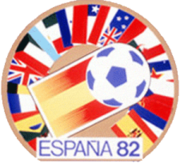 1982 FIFA World Cup official logo | |||||||||||||
| Tournament details | |||||||||||||
| Host country |  Spain Spain | ||||||||||||
| Dates | 13 June – 11 July (29 days) | ||||||||||||
| Teams | 24 (from 6 confederations) | ||||||||||||
| Venue(s) | 17 (in 14 host cities) | ||||||||||||
| Final positions | |||||||||||||
| Champions |  Italy (3rd title) Italy (3rd title) | ||||||||||||
| Runners-up |  West Germany West Germany | ||||||||||||
| Third place |  Poland Poland | ||||||||||||
| Fourth place |  France France | ||||||||||||
| Tournament statistics | |||||||||||||
| Matches played | 52 | ||||||||||||
| Goals scored | 146 (2.81 per match) | ||||||||||||
| Attendance | 2,109,723 (40,572 per match) | ||||||||||||
| Top scorer(s) |  Paolo Rossi (6 goals) Paolo Rossi (6 goals) | ||||||||||||
| Best player |  Paolo Rossi Paolo Rossi | ||||||||||||
| Tournament details | |
|---|---|
| Dates | 26 March 1980 – 10 January 1982 |
| Teams | 109 (from 6 confederations) |
| Tournament statistics | |
| Matches played | 306 |
| Goals scored | 797 (2.6 per match) |
| Top scorer(s) |  Gary Cole Gary Cole  Steve Sumner Steve Sumner  Brian Turner Brian Turner  Karl-Heinz Rummenigge Karl-Heinz Rummenigge (9 goals each) |
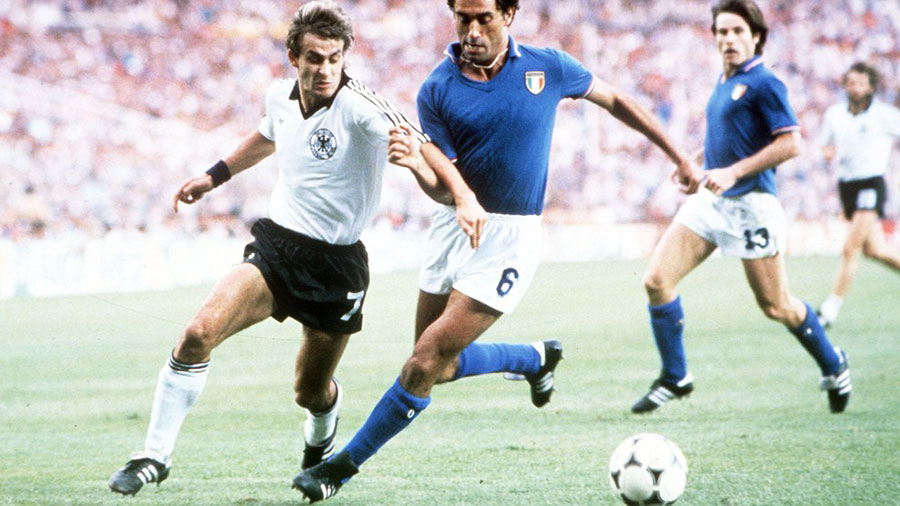
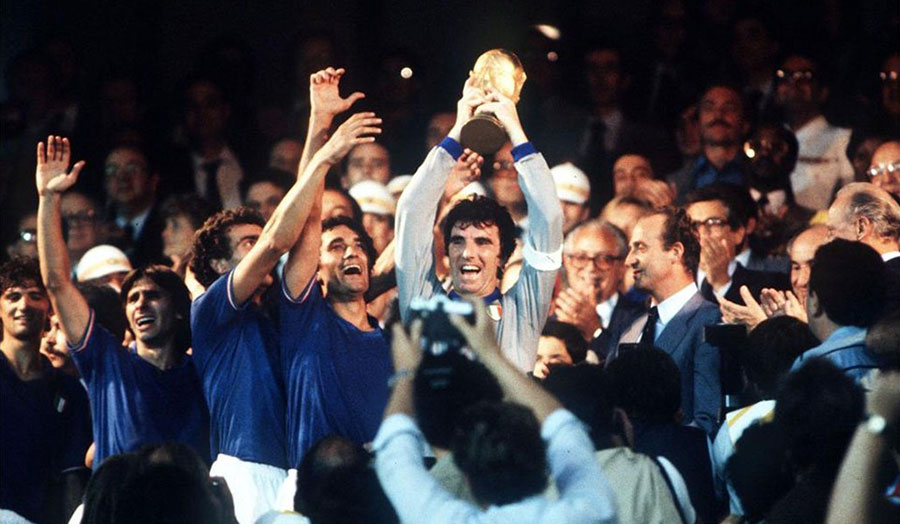
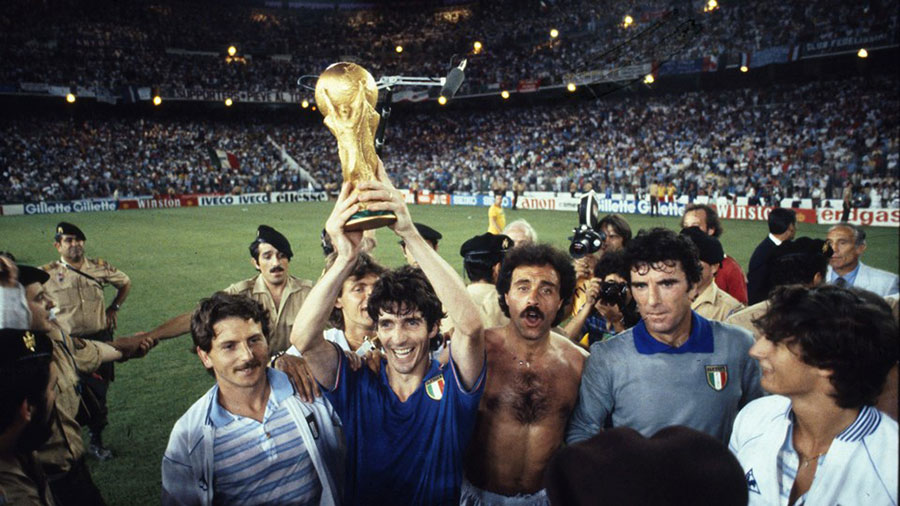
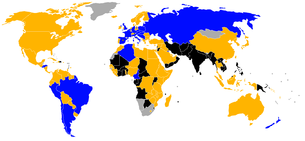


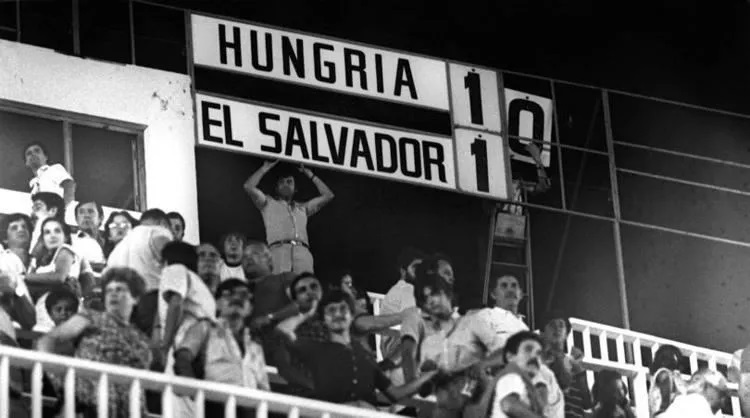
 1982 World Cup Finals, La Coruna, Spain, 19th June, 1982, Poland 0 v Cameroon 0, Cameroon’s Roger Milla talks to Poland’s Andre Szarmach and Marek Dziuba before the match (Photo by Bob Thomas Sports Photography via Getty Images)
1982 World Cup Finals, La Coruna, Spain, 19th June, 1982, Poland 0 v Cameroon 0, Cameroon’s Roger Milla talks to Poland’s Andre Szarmach and Marek Dziuba before the match (Photo by Bob Thomas Sports Photography via Getty Images)  1982 World Cup Finals, Vigo, Spain, 23rd June, 1982 Italy 1 v Cameroon 1, Italian goalkeeper and captain Dino Zoff (R) exchanges pennants with Cameroon goalkeeper and captain Thomas N’Kono at the toss up before the match (Photo by Bob Thomas Sports Photography via Getty Images)
1982 World Cup Finals, Vigo, Spain, 23rd June, 1982 Italy 1 v Cameroon 1, Italian goalkeeper and captain Dino Zoff (R) exchanges pennants with Cameroon goalkeeper and captain Thomas N’Kono at the toss up before the match (Photo by Bob Thomas Sports Photography via Getty Images)
 England line-up v France
England line-up v France

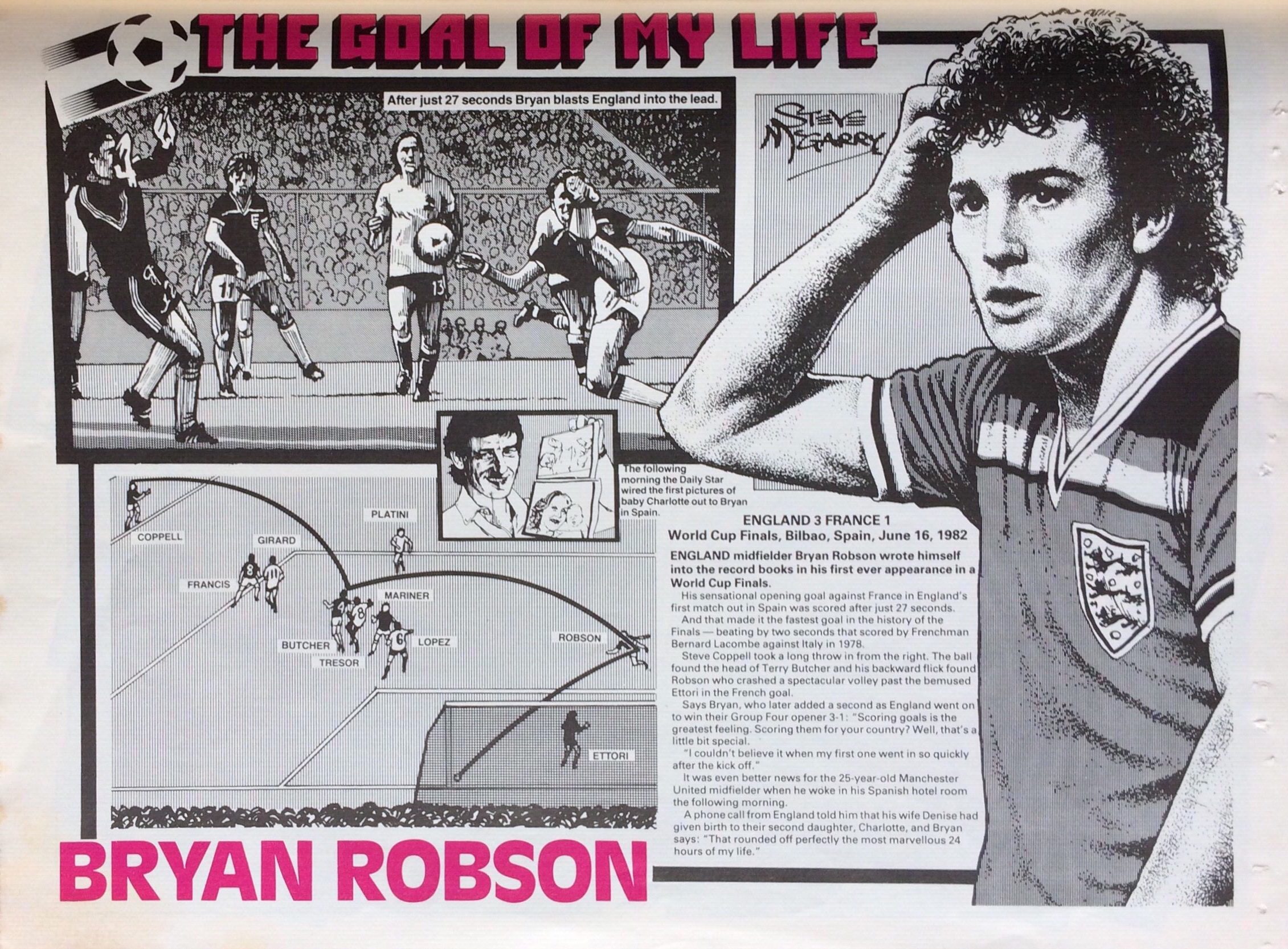
 ‘The Goal of my Life’ series by Steve McGarry (Match Weekly)
‘The Goal of my Life’ series by Steve McGarry (Match Weekly) 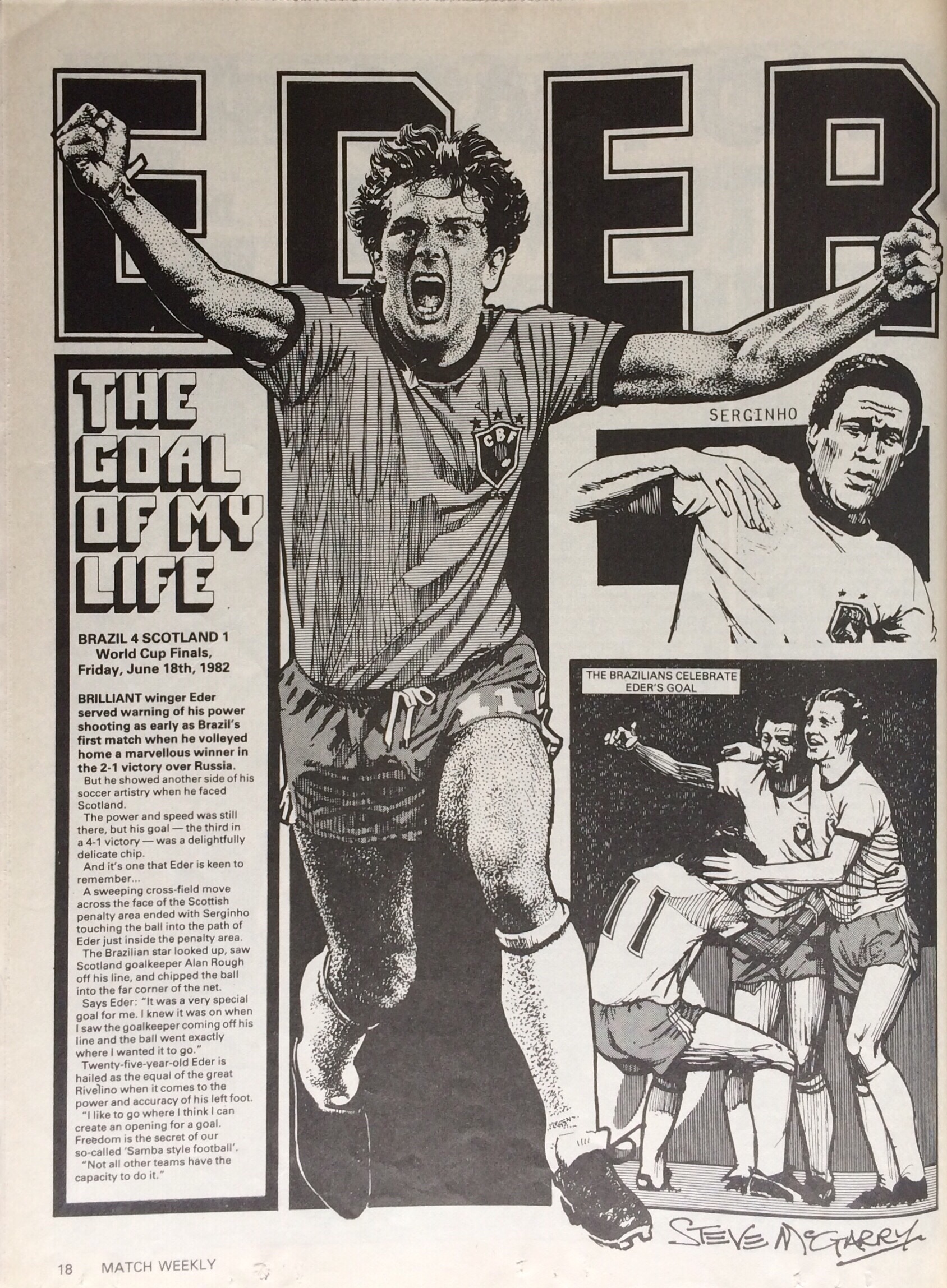

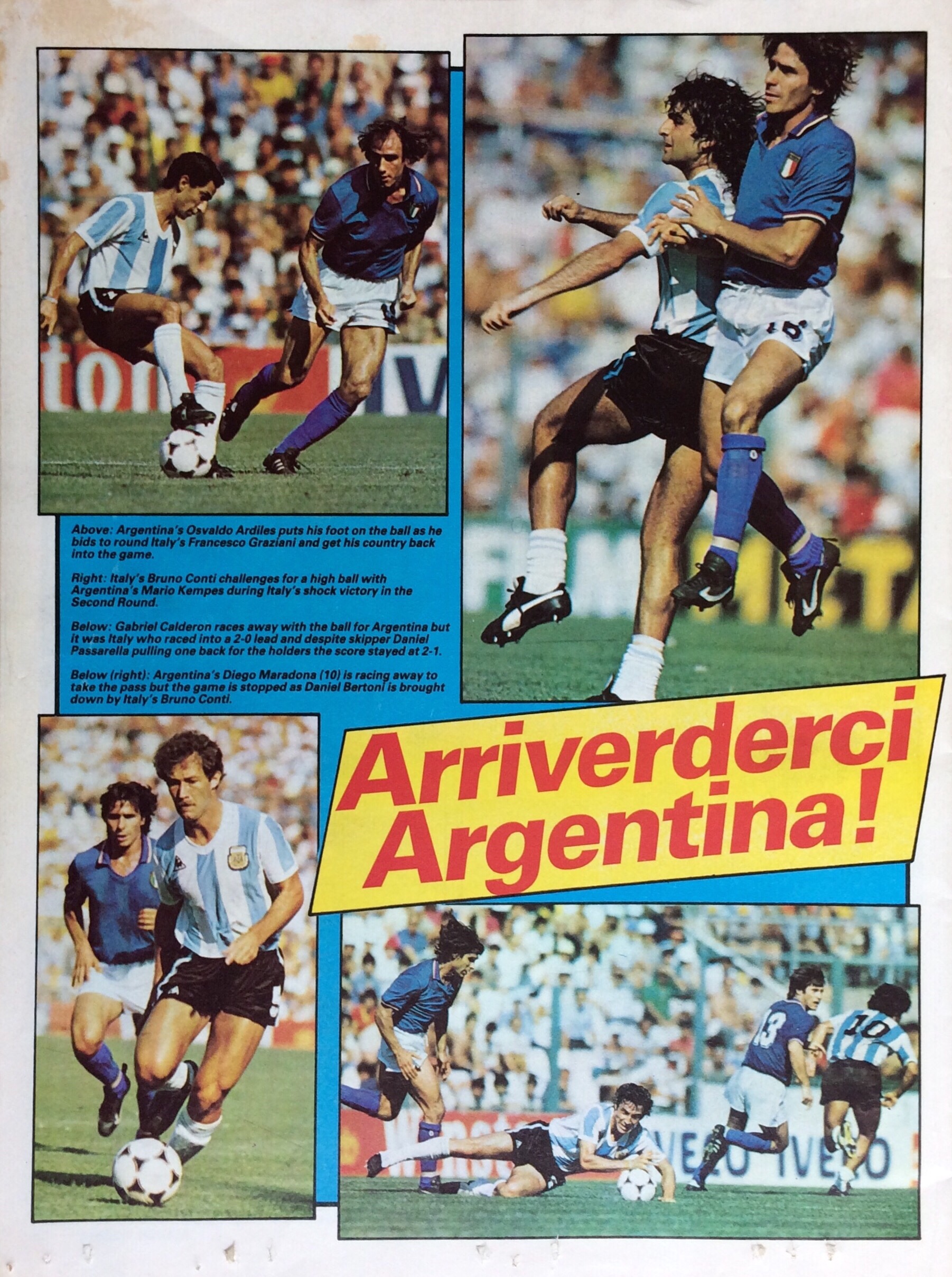

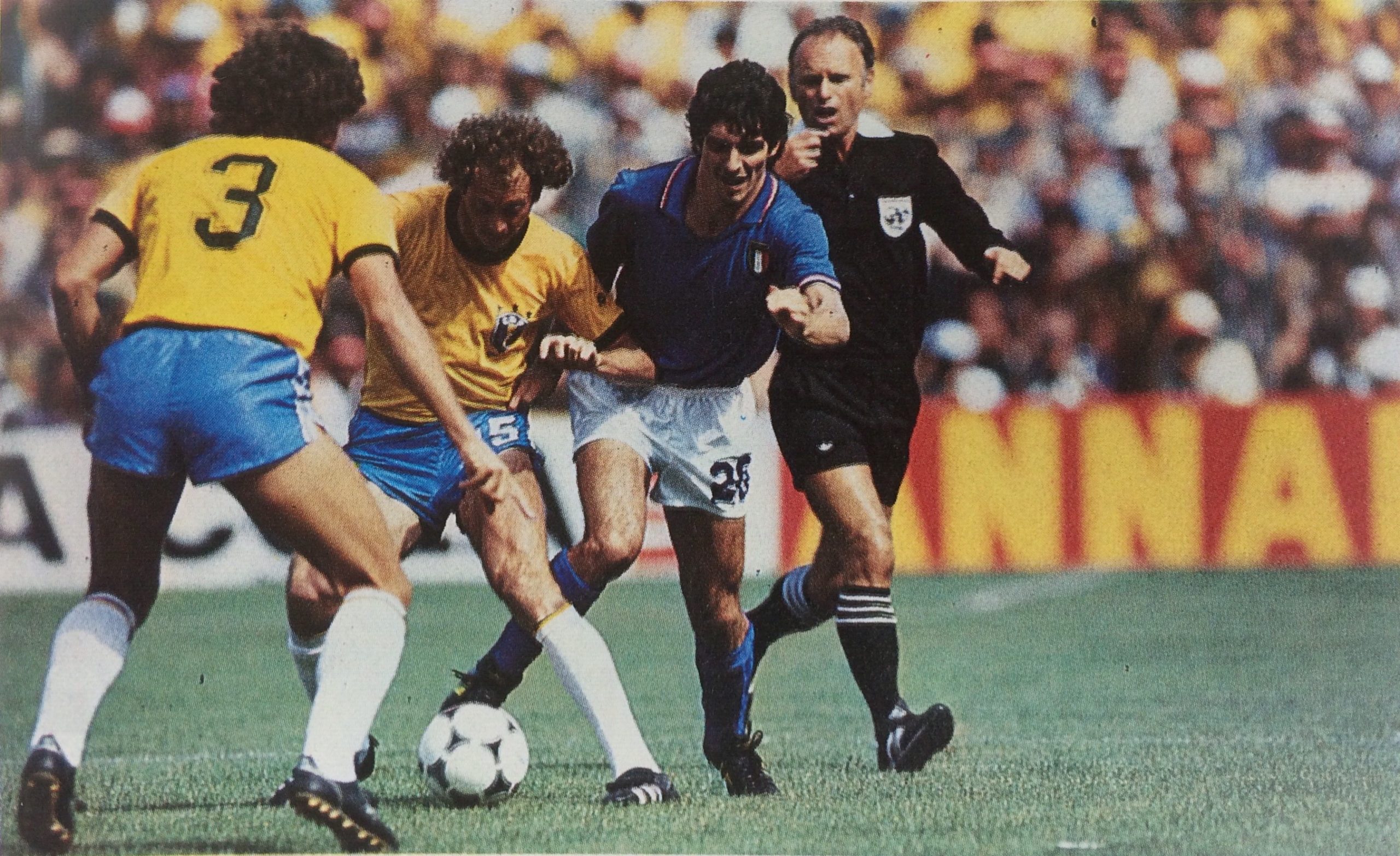


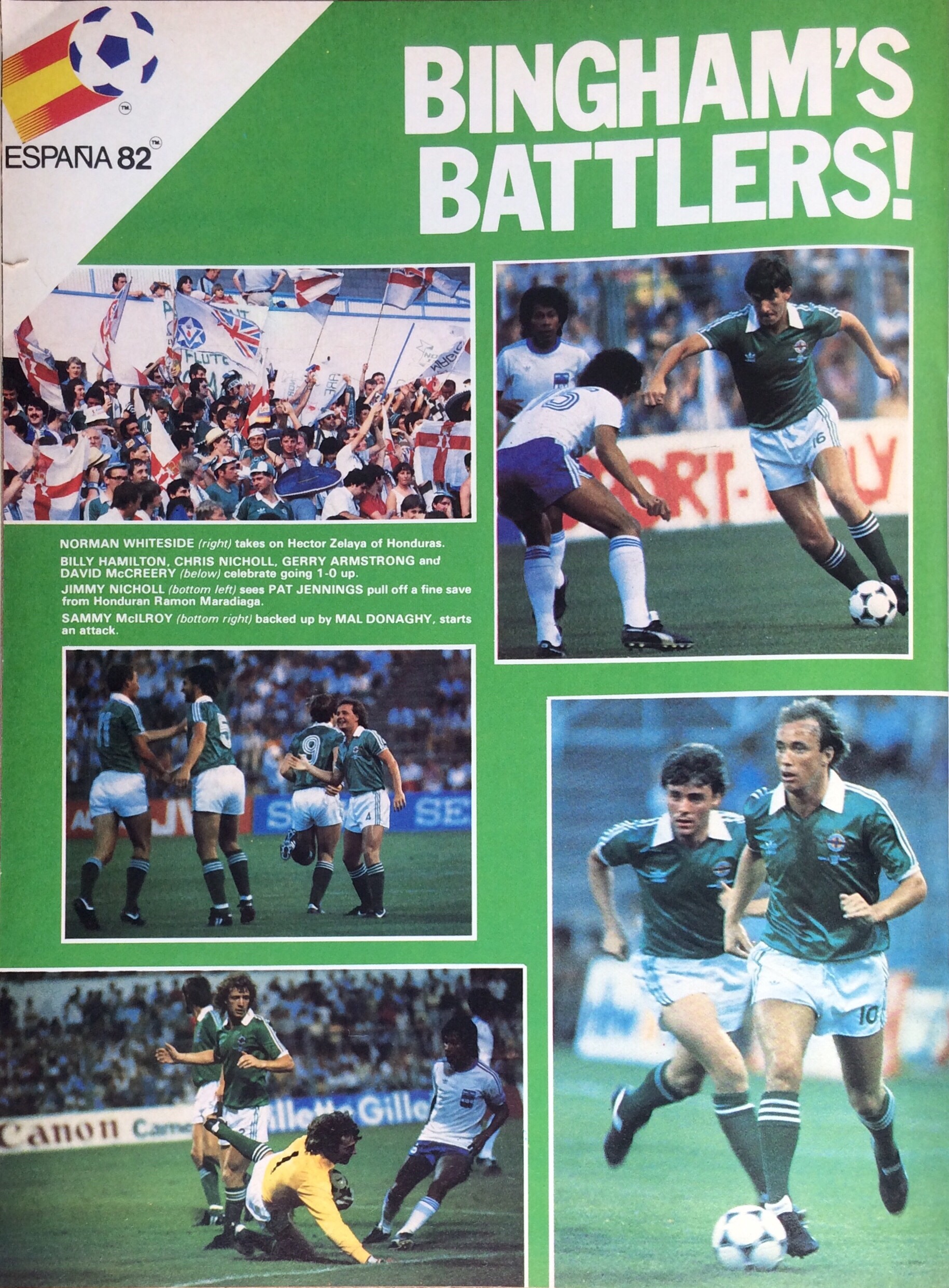





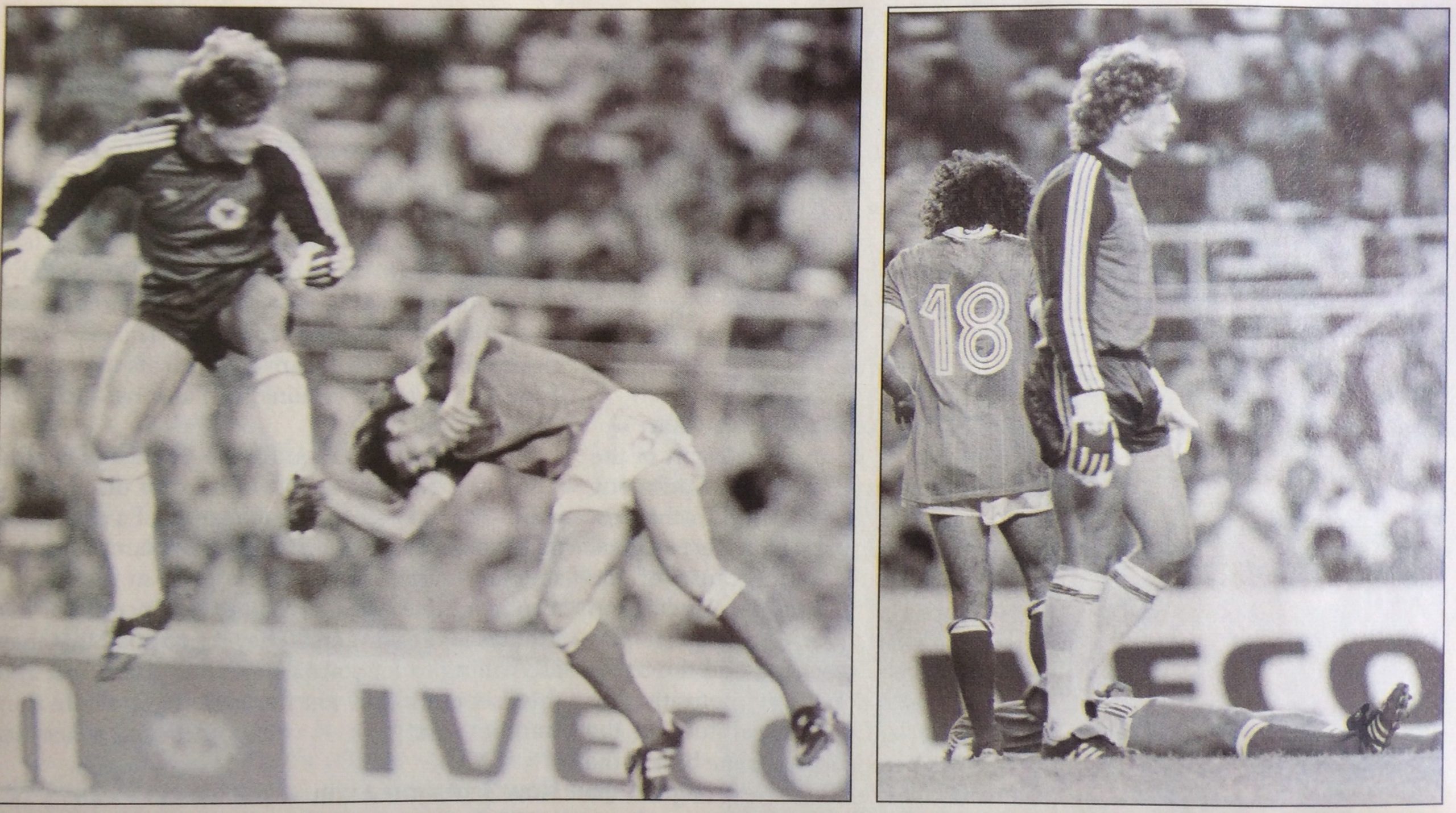

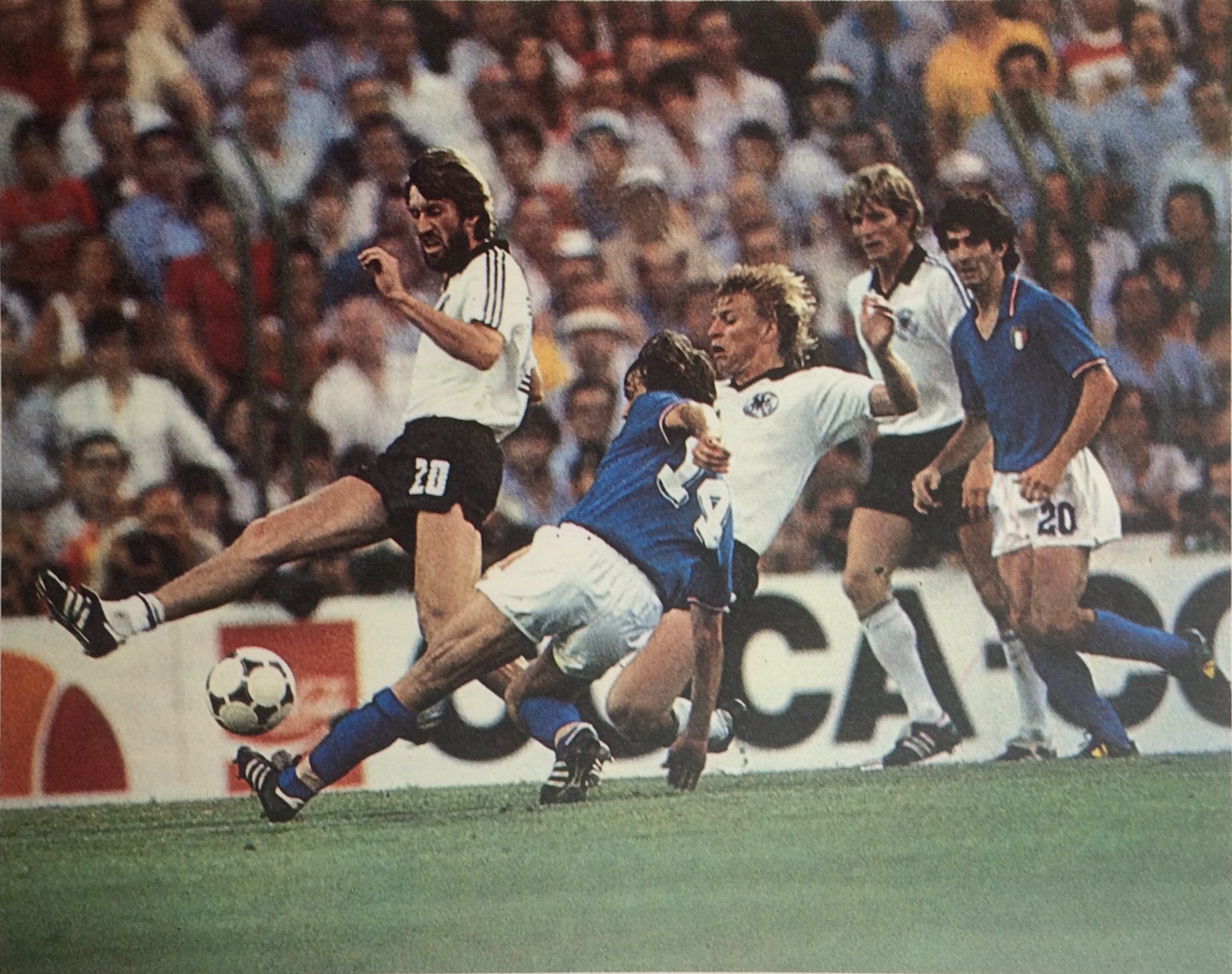
 Marco Tardelli scores for Italy in the 1982 World Cup Final
Marco Tardelli scores for Italy in the 1982 World Cup Final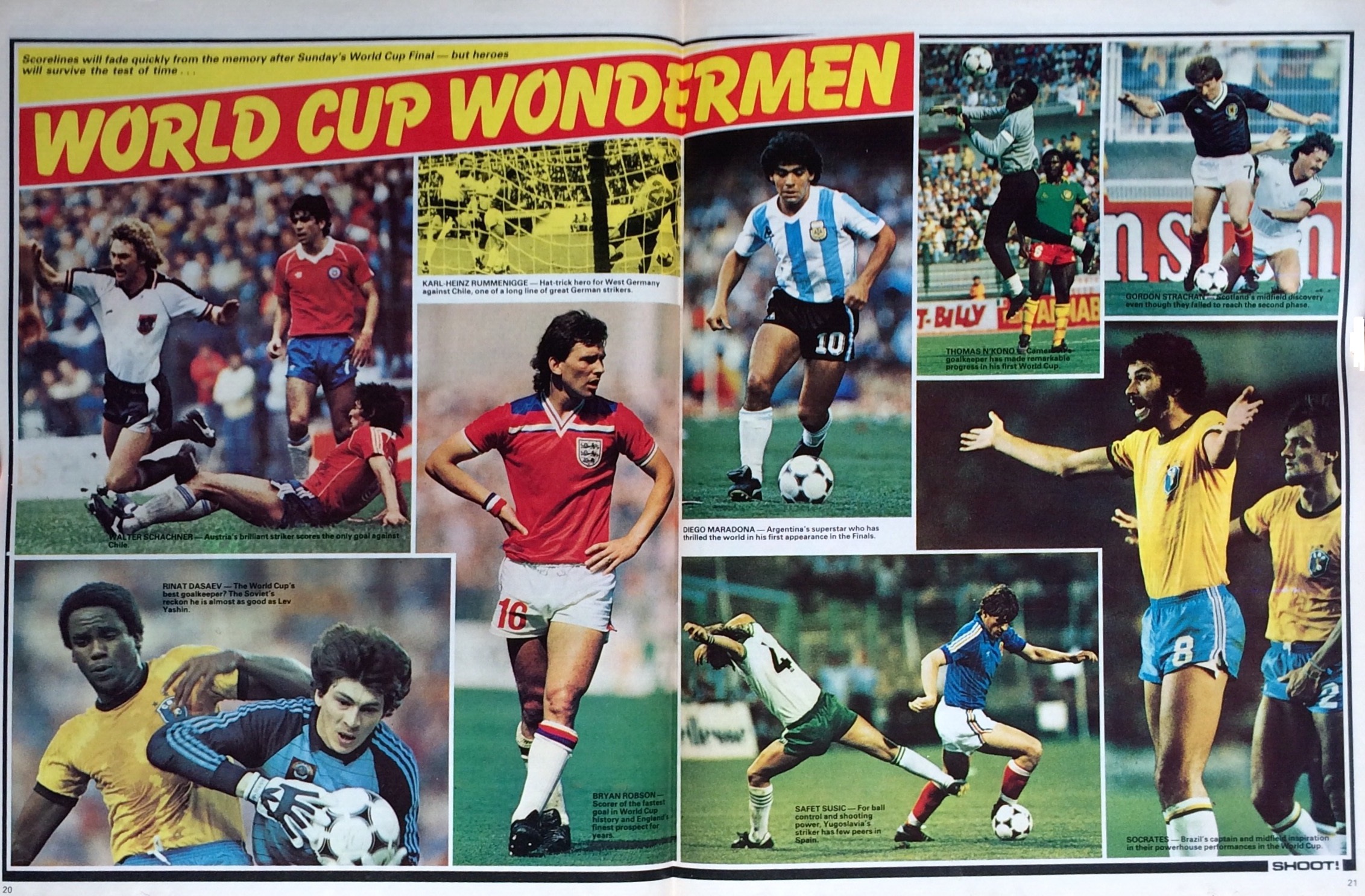

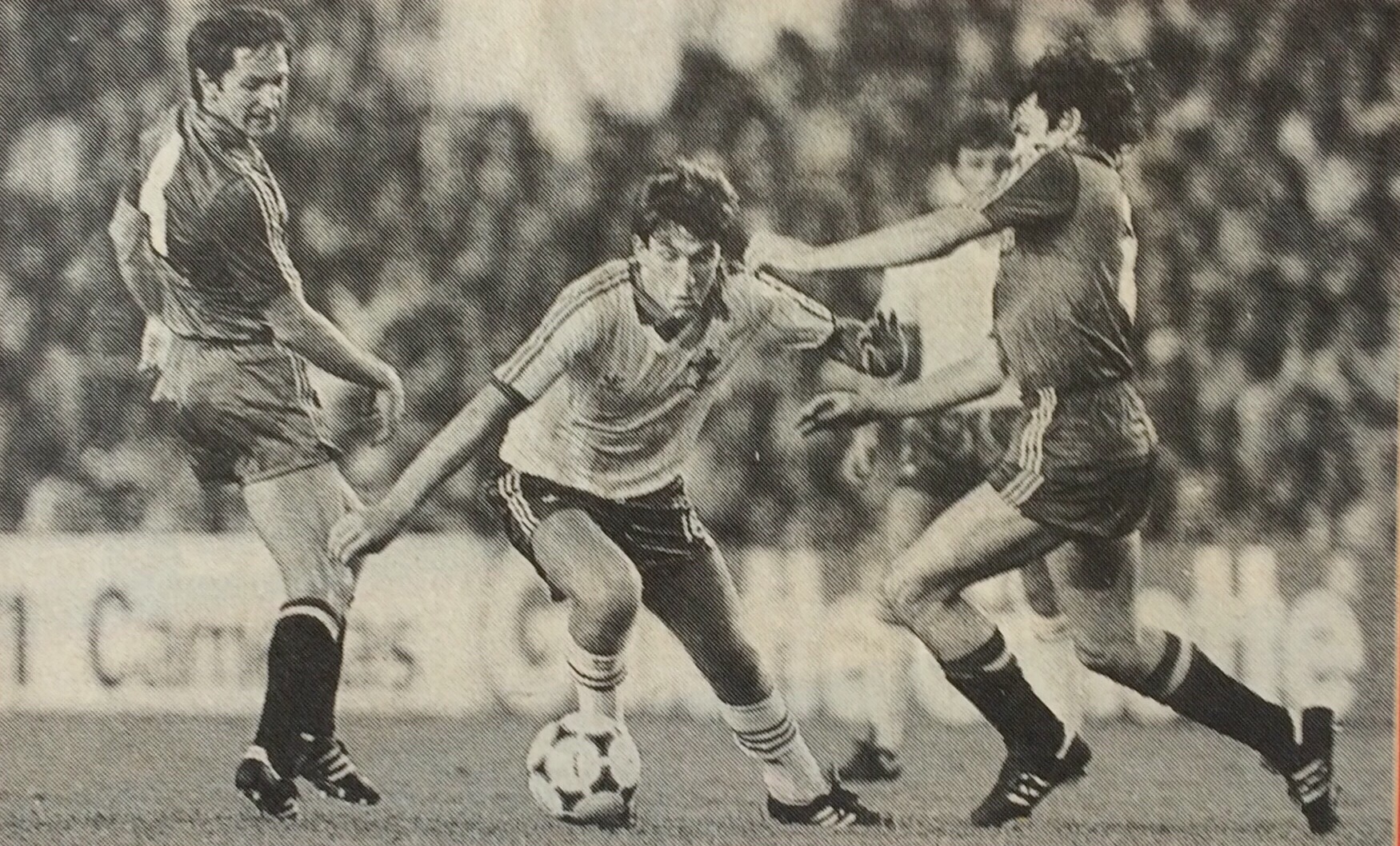 Norman Whiteside, Northern Ireland v Spain
Norman Whiteside, Northern Ireland v Spain  Argentina v Brazil, 1982 World Cup
Argentina v Brazil, 1982 World Cup  Alain Giresse, France (Match Weekly)
Alain Giresse, France (Match Weekly)

 1982 World Cup Report by Colin Benson – Above: Group 1, 2 & 3 Below: Groups 4-6
1982 World Cup Report by Colin Benson – Above: Group 1, 2 & 3 Below: Groups 4-6 